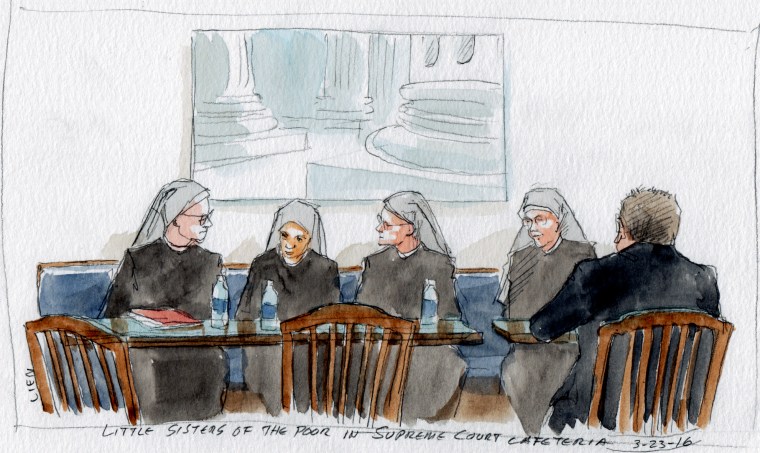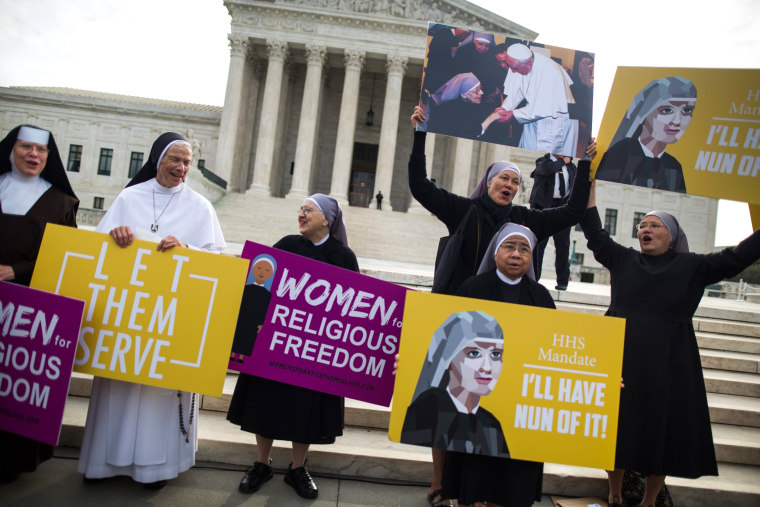Who will bear the burden? That’s the question at the heart of Zubik v. Burwell, a rematch argued before the Supreme Court Wednesday for both the Affordable Care Act and contraceptive access.
Will it be the religiously affiliated nonprofits — schools and nonprofits and a nursing home chain run by nuns — that no longer have to pay for the required insurance coverage of birth control but say the government’s alternative plan of sending a form to their insurer still “hijacks” their plan? Or will it be the women who work for those companies who choose to use contraception but may have to look outside their insurance plans for that coverage?

At oral argument Wednesday, attorney Paul Clement argued for the plaintiffs that what the government calls an “accommodation” is religiously offensive to his clients because it involves them in sin. He even compared the “hijacking” of the insurance plans to cover contraception to the government renting out a room in a nun’s home to run a free birth control clinic. “Just because this is more intangible, I don’t think the principle is any different,” Clement said.
RELATED: Supreme Court appears headed for tie in Obamacare case
Solicitor General Donald Verrilli, once again defending the provision of the Affordable Care Act, asked the court to think about the female employees who don’t share the religious beliefs of their employers, and whose equal access to seamless coverage of birth control was at stake. “Consider this, please, from the perspective of the woman employee,” he said. With the alternative proposed by the plaintiffs, she might have to buy a separate plan on the exchanges just for contraception, and possibly have to seek a different doctor just for that care.
“The whole point here,” Verrilli told Justice Samuel Alito, “is that Congress wanted to eliminate even what were perceived by most [as] the small barriers … Even those small barriers work as a sufficient disincentive that many fewer people use contraception than would otherwise.”
The federal Religious Freedom Restoration Act, signed into law by Bill Clinton, says that the government cannot substantially burden religion, unless it has a compelling interest, and provided it is taking the least restrictive path. The question of substantial burden has been a thorny one for the plaintiffs: The government says that the plaintiffs aren’t being substantially burdened by what they call a workaround, with the vast majority of lower-court judges agreeing with them. Meanwhile, the groups say substantial burden is for them to decide.

To Chief Justice Roberts, the more noxious burden seemed clear. “It’s a question, whether you want the employee to sign a paper or you want the Little Sisters to sign a paper,” he said. “In the one case, it’s an administrative burden as you’ve said. In the other case, it’s a violation of a basic principle of faith.”
But the question of where this was all leading clearly perturbed the liberal justices. They said the proper way to think of the trade-off is that religious groups can’t object to behavior that other people are engaging in. “If we are not asking you to do anything except identify yourself, and if who is going to do the action is either the government or a third party, that that’s the balance that we have struck,” said Sotomayor. “That it’s not a substantial burden if someone else is going to do the act that you’re objecting to.”
She added that she did not dispute the sincerity of the objectors, another key requirement of the law. “I’m not naysaying that that is a very substantial perceived personal burden by them,” Sotomayor said. “But if that’s always going to be substantial, how will we ever have a government that functions?”
RELATED: U.S. Supreme Court declines to referee state disputes over marijuana
In other words, the plaintiffs can’t object to what the government sees as simply objecting — a slippery slope. Clement disputed that description. He said his clients were willing to state their opposition to contraception, just not be so involved in the end result of someone getting it.
“But what happens if somebody did just object to objecting?” asked Justice Elena Kagan. “It seems all your arguments would apply the same way.” She added, “Your theory of the case says that everything depends on a person coming in saying this is against my religion, and that being the end-all and the be-all.”
Justice Anthony Kennedy, the traditional swing vote, asked skeptical questions of both sides, but seemed to tip his hand when he used the word “hijack” to describe what the government was doing to the plans — the plaintiff’s exact framing. Still, the case has lost some force with the death of Justice Antonin Scalia. With the three other Republican appointees likely to vote for the plaintiffs, a 4-4 split means the lower courts’ result stands. The religious objectors have lost in eight courts and won in only one, the 8th Circuit Court of Appeals, covering a swath of the Midwest.
One thing is clear: What the court meant in its 2014 Hobby Lobby decision is very much unresolved. In that case, five justices of the Supreme Court, including Kennedy, said that the government couldn’t force for-profit corporations to comply with the policy if their owners had religious objections. Kennedy, writing separately, even pointed to the fact that “there is an existing, recognized, workable, and already-implemented framework to provide coverage,” which meant that the government in fact did have a less restrictive means to get women contraception.
As it happens, those for-profit companies, including the craft chain Hobby Lobby, have also been offered the same “accommodation” that was before the court today, so their employees will also be affected by the results.
At oral argument two years ago, when Sotomayor asked the same attorney, Clement, about the accommodation, he was careful not to take a position.
“We haven’t been offered that accommodation,” Clement said, “so we haven’t had to decide what kind of objection, if any, we would make to that.”
RELATED: Birth control is back at the Supreme Court
On Wednesday, there was a strikingly similar exchange. Kagan asked, ”Is there any accommodation that the government would offer that would in fact result in women employees of your clients, or students of your clients, getting health care as part of an employer-based plan or a student-based plan, getting contraceptive coverage? Is there any accommodation that would be acceptable?”
Clement’s colleague Noel Francisco gave a complicated non-answer. Kagan pressed him again.
“Your Honor, possibly so, possibly not, and if I could explain,” Francisco said. “We’ve not been offered that kind of alternative to consider.”
He left open the door that there will always another objection to an objection and another, less-restrictive means to point to. Where it ends is anyone’s bet.